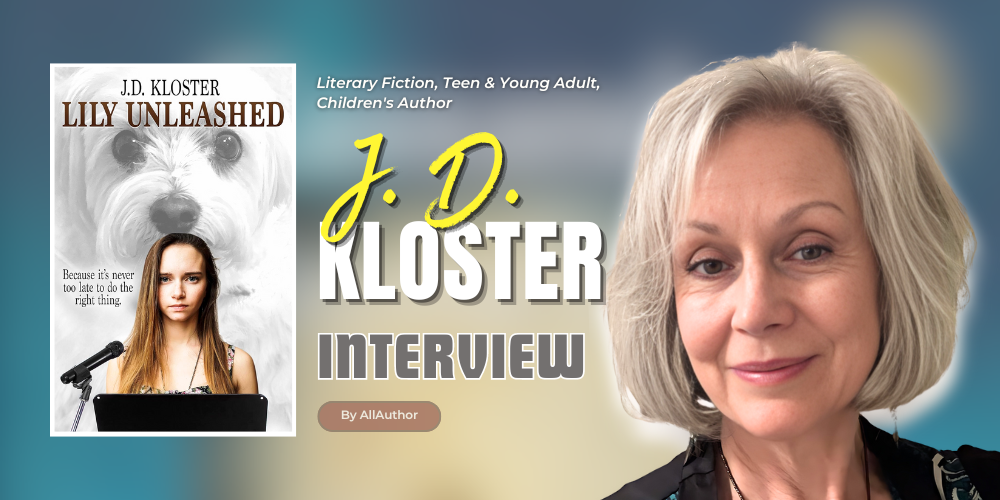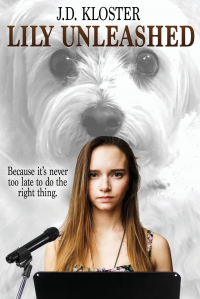J. D. Kloster Interview Published on: 20, May 2024
 What inspired you to transition from being a teacher to becoming an author?
What inspired you to transition from being a teacher to becoming an author?
I always loved writing. My undergrad degree is in communications. I was a stringer for the Sacramento Bee. And when faced with the challenge of trying to explain puppy mills to my students I couldn’t find a book. So I decided to write my own.
How did your experiences as a teacher influence your writing style and the themes you explore in your books?My experience as a teacher allowed me to depict actual classroom events from having been “up close and personal” with students for twenty five years.
Can you tell us about your journey to becoming a Humane Policy Volunteer Leader for the Humane Society of the United States?During the course of researching puppy mills and how the whole commercial dog breeding industry works, I contacted the HSUS a number of times and learned all that they do to benefit animals. I wanted to be part of an organization dedicated to animal welfare so I inquired about being a volunteer.
How do you balance your passion for animal welfare advocacy with your career as an author?I am still employed as a teacher: I am an ESL tutor helping newly arrived refugee students learn English. It’s always a balancing act. Right now I am focusing more on building a coalition of animal welfare advocates with local citizens in my town and with my elected officials. My goal is to pass legislation in my state that creates standards for anyone breeding dogs for profit.
What prompted you to establish Empty Cages Press, and what is its mission?I learned that effective “branding” can promote success for any endeavor. I thought about what my message was for my mission to end puppy mills via grass roots activities and awareness using my book Lily Unleashed. So I decided upon “Empty Cages Press” because my goal is to empty all the puppy mill cages of the breeding mama and papa dogs in America who are locked in cages and get nothing that dogs need to be happy and healthy.
How do you believe reading and storytelling can positively impact society, particularly in terms of animal welfare awareness?A great story that touches people, makes them laugh, cry and cheer, can do a lot to promote action.
Could you share some insights into your debut novel, “Lily Unleashed”? Do you have any specific rituals or routines?Lily Unleashed, I believe, is a unique novel. It was inspired by the love of a tiny white dog that was rescued from a Wisconsin puppy. Cagney, the dog in this novel, is based on my real life puppy mill survivor. My Cagney had the biggest love and became my special boy and my heart dog. This book is his legacy. Created to inspire readers to become advocates as Lily became an advocate by learning about the problem of puppies sold at pet stores and online. They will learn how poorly the government-funded USDA bureaucracy overseas commercial dog breeders who run these puppy factories and how abysmal the living conditions are for the thousands of dogs locked in cages 24 seven never receiving anything dogs need to be healthy and happy.
Your website mentions cultivating engaged readers. How do you believe educators and authors can work together to foster a love of reading in children?Classroom visits whether in person or via zoom where students get to learn about the author’s passions and also ask questions can, I believe, stoke the curiosity fires within children.
What advice would you give to aspiring authors who want to use their platform for advocacy, whether it's for animals or other social causes?Put yourself out there – get in public places like farmer’s markets and events in your town where you mingle land share your story/passion with citizens of your town. This shows your sincerity and desire to make a difference for your cause.
Can you discuss any upcoming projects or books you're currently working on?Right now I am working on coalition building in my area. The goal is to pass legislation that raises standards for anyone breeding dogs for profit. And also, my mission is to present via PowerPoint presenation, to local groups so they learn how pet store puppies and puppies sold on line are a major consumer welfare problem. The dogs produced from puppy mill mamas have major problems emotionally and physically due to poor breeding. And the consumer is never told about these problems. It’s why 25% of dogs in shelters are purebreds. And it contributes to higher euthanasia rates at America’s shelters. Puppy mill dogs are surrendered too frequently when their owners can’t afford their medical and emotional problems.
How do you approach incorporating messages about animal welfare and compassion into your storytelling without coming across as preachy?I use stories that kids can relate to – things that they could see happening in their lives. It must always be relatable.
What do you hope readers take away from your books, particularly concerning animal rights and welfare.I want my readers to come away with the understanding of the power they have to end the atrocity called puppy mills. And I want them to also understand why going to shelters and rescues matters in the larger picture of ending the cruelty dogs experience living locked in cages 24/7. My readers need to identify with Lily and then share her story.
In what ways do you think literature can serve as a tool for promoting empathy and understanding towards animals and their rights?A well written story, where the reader truly identifies with the issue and then sees how they can help is the best way to promote empathy. Readers need to identity with the characters in order to truly empathize.
How do you stay informed about current animal welfare issues, and how does this influence your writing?I receive updates from the Humane Society of the US that keeps me abreast of issues and legislation that needs to be promoted. This information allows me to create social media posts that inform the public and to ask them to speak up to elected officials on specific animal welfare legislation.
Finally, how has AllAuthor helped you with the promotion of your books? Would you recommend this platform to your author friends?AllAuthor has created effective and spot on blurbs with my book promotions along with great photos and scenes of my bookcover. I have then shared AllAuthors posts on my social media.
Share J. D. Kloster's interview
J.D. Kloster is a passionate advocate for both literature and animal welfare. With a childhood spent immersed in books at the local library, she developed a deep love for storytelling that she later shared with her students as a teacher, fostering a community of engaged readers. Her mission is twofold: to cultivate engaged readers and to advocate for the "voiceless" on important animal welfare issues.


